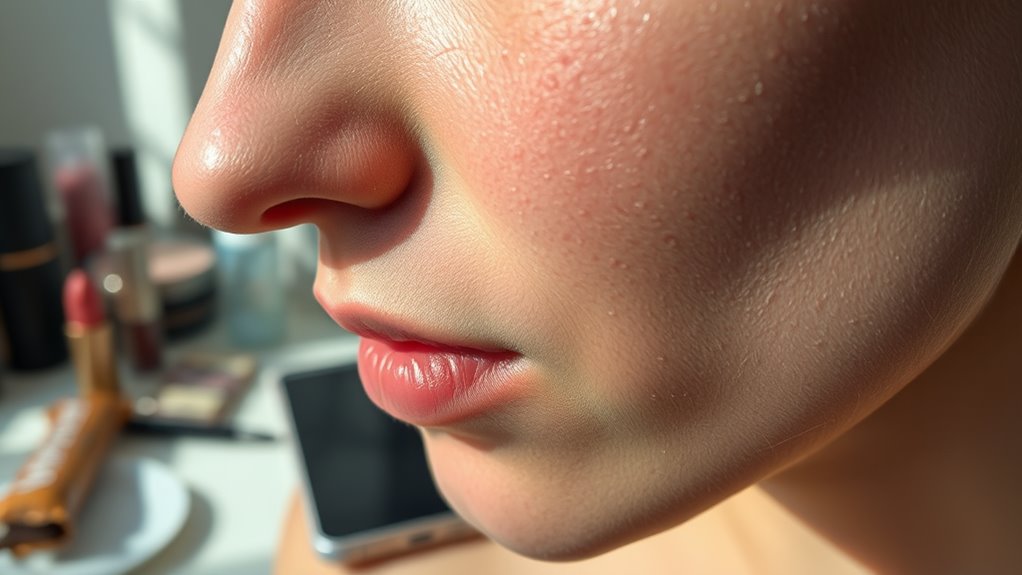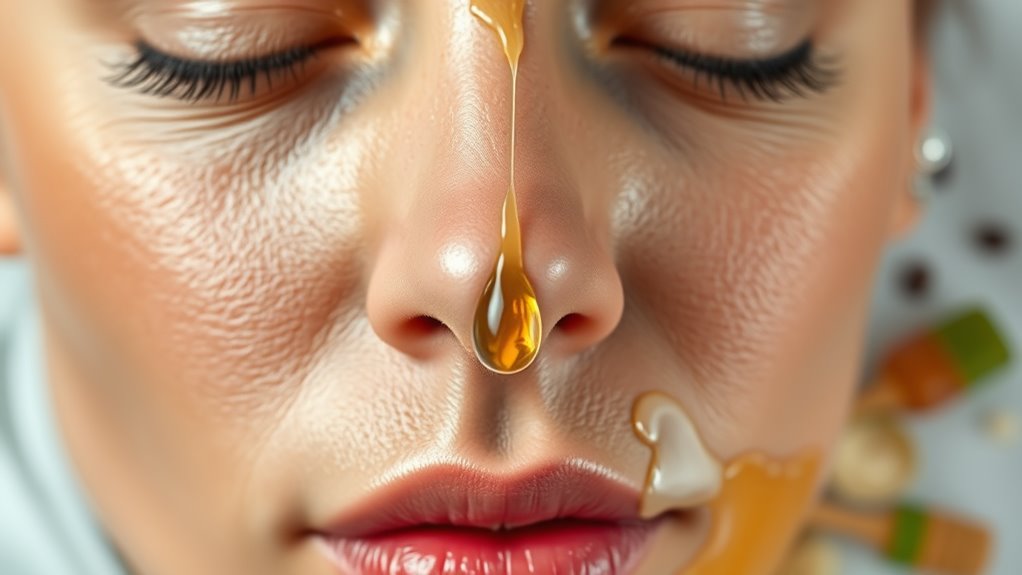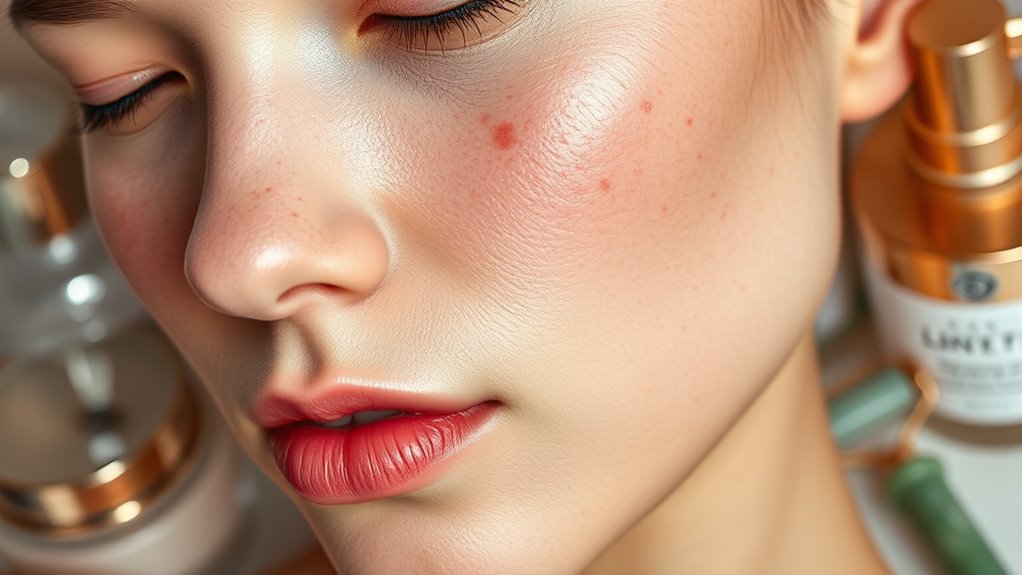Surprising Reasons Your Skin Is Always Breaking Out
Your skin might be breaking out due to surprising factors like hormonal fluctuations, poor dietary choices, and stress. Hormonal changes, particularly around menstruation or puberty, can increase oil production. High sugar diets may spike insulin, leading to more breakouts. Stress raises cortisol levels, which can clog pores. Furthermore, environmental factors like pollution or irritants can aggravate existing skin conditions. Understanding these elements can help you manage your skin better, and exploring these topics can provide deeper insights.
Key Takeaways
- Hormonal fluctuations during menstruation, pregnancy, or puberty can trigger increased oil production, leading to breakouts.
- A diet high in sugar and refined carbs spikes insulin, boosting oil production and causing acne.
- Stress elevates cortisol levels, resulting in increased oil production and clogged pores that contribute to breakouts.
- Environmental factors like pollution and humidity fluctuations can disrupt skin balance, exacerbating acne issues.
- Inconsistent skincare routines may fail to address specific skin concerns, leaving skin vulnerable to breakouts.
Hormonal Fluctuations and Their Impact
When your hormones fluctuate, it can significantly impact your skin, often leading to unwanted breakouts. Hormonal changes, particularly during menstruation, pregnancy, or puberty, can trigger increased oil production in your sebaceous glands.
This excess oil clogs pores, providing a breeding ground for acne-causing bacteria. Additionally, fluctuations in hormones like testosterone and estrogen can alter skin cell turnover rates, exacerbating the risk of blockages and inflammation.
Understanding these acne causes is crucial for effective management. You might find that tracking your hormonal cycles and adjusting your skincare routine accordingly can help mitigate breakouts. Incorporating proven tips for preventing acne can also further combat the effects of hormonal fluctuations, leading to clearer skin over time.
Incorporating targeted treatments, such as salicylic acid or benzoyl peroxide, can further combat the effects of hormonal fluctuations, leading to clearer skin over time.
The Role of Diet in Skin Health
Although you may not realize it, your diet plays a crucial role in maintaining skin health and can significantly influence the occurrence of breakouts. Foods high in sugar and refined carbohydrates can spike insulin levels, leading to increased oil production and clogging pores.
On the other hand, incorporating a variety of fruits, vegetables, and healthy fats can enhance your skin’s resilience. Antioxidants found in berries, vitamins A and E from leafy greens, and omega-3 fatty acids from fish contribute to a balanced, glowing complexion. Additionally, avoiding foods that contribute to acne can further help in preventing breakouts.
Staying hydrated is equally vital, as water flushes out toxins and keeps skin plump. By making informed dietary choices, you empower yourself to improve your skin’s condition and reduce the frequency of unsightly breakouts.
Stress and Its Connection to Breakouts
Diet isn’t the only factor influencing skin health; stress plays a significant role as well. When you’re stressed, your body releases cortisol, a hormone that can increase oil production in your skin. This excess oil can clog pores, leading to breakouts.
Additionally, stress can trigger inflammation, exacerbating existing skin conditions such as acne. You might also find that stress affects your behavior, leading to habits like touching your face or neglecting your skincare routine, both of which can contribute to breakouts. Moreover, chronic stress can lead to prolonged skin issues, making it essential to address stress levels effectively.
To mitigate these effects, consider adopting stress management techniques like mindfulness, exercise, or adequate sleep. By addressing the root cause of stress, you can create a more favorable environment for your skin to heal and thrive.
Environmental Factors You Might Overlook
While you may focus on diet and stress, environmental factors can significantly impact your skin’s health and contribute to breakouts.
Pollution, for instance, exposes your skin to harmful particles that clog pores and trigger inflammation. Additionally, changes in humidity and temperature can disrupt your skin’s moisture balance, leading to excess oil production or dryness.
You might also overlook the effects of harsh cleaning products or chemical-laden cosmetics that can irritate your skin.
Even your home environment plays a role; dust, pet dander, and mold can exacerbate skin issues. Understanding sensitive skin is crucial in identifying the best products and routines that suit your unique needs.
Recognizing these environmental triggers is essential for a comprehensive approach to managing breakouts, allowing you to create a healthier skin environment and minimize flare-ups.
The Importance of Proper Skincare Routine
When you establish a proper skincare routine, you create a foundation for healthy skin that can significantly reduce the likelihood of breakouts. Consistency is key; a well-structured regimen tailored to your skin type addresses specific concerns while maintaining balance.
Cleansing removes impurities and excess oil, while exfoliating promotes cell turnover, preventing clogged pores. Moisturizing hydrates your skin, reinforcing its barrier against environmental stressors.
Incorporating targeted treatments, such as serums or spot treatments, can enhance your routine by directly addressing acne triggers. Remember, using products with active ingredients should align with your skin’s needs to avoid irritation. Additionally, avoiding a common acne skincare mistake can further improve your results and help you achieve the clear skin you desire.
Ultimately, a disciplined approach fosters resilience, allowing your skin to thrive and minimizes the chances of unsightly breakouts.




